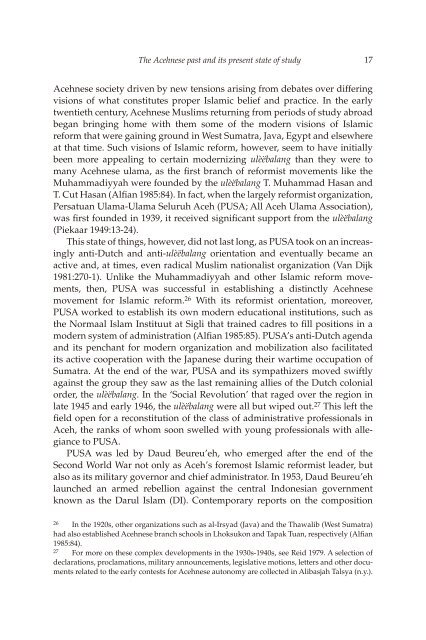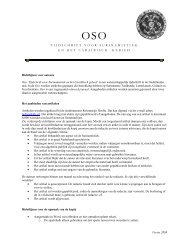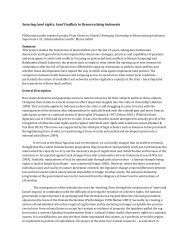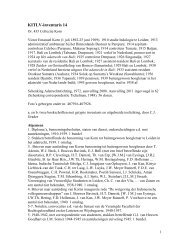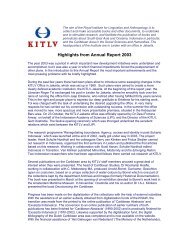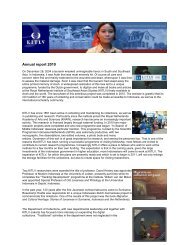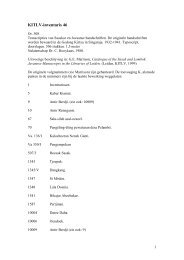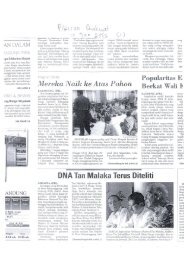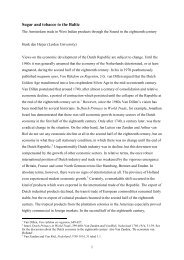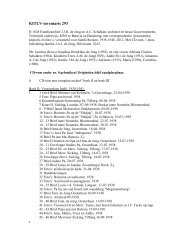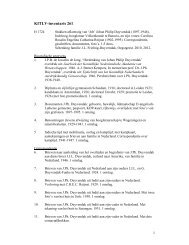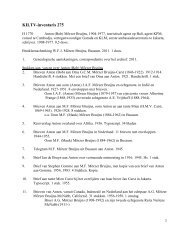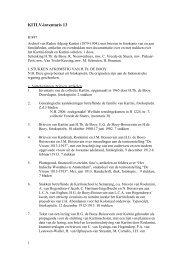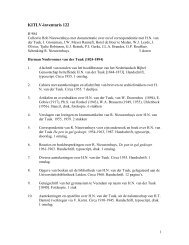The Acehnese past and its present state of study R. Michael ... - kitlv
The Acehnese past and its present state of study R. Michael ... - kitlv
The Acehnese past and its present state of study R. Michael ... - kitlv
Create successful ePaper yourself
Turn your PDF publications into a flip-book with our unique Google optimized e-Paper software.
<strong>The</strong> <strong>Acehnese</strong> <strong>past</strong> <strong>and</strong> <strong>its</strong> <strong>present</strong> <strong>state</strong> <strong>of</strong> <strong>study</strong> 17<br />
<strong>Acehnese</strong> society driven by new tensions arising from debates over differing<br />
visions <strong>of</strong> what constitutes proper Islamic belief <strong>and</strong> practice. In the early<br />
twentieth century, <strong>Acehnese</strong> Muslims returning from periods <strong>of</strong> <strong>study</strong> abroad<br />
began bringing home with them some <strong>of</strong> the modern visions <strong>of</strong> Islamic<br />
reform that were gaining ground in West Sumatra, Java, Egypt <strong>and</strong> elsewhere<br />
at that time. Such visions <strong>of</strong> Islamic reform, however, seem to have initially<br />
been more appealing to certain modernizing ulèëbalang than they were to<br />
many <strong>Acehnese</strong> ulama, as the fi rst branch <strong>of</strong> reformist movements like the<br />
Muhammadiyyah were founded by the ulèëbalang T. Muhammad Hasan <strong>and</strong><br />
T. Cut Hasan (Alfi an 1985:84). In fact, when the largely reformist organization,<br />
Persatuan Ulama-Ulama Seluruh Aceh (PUSA; All Aceh Ulama Association),<br />
was fi rst founded in 1939, it received signifi cant support from the ulèëbalang<br />
(Piekaar 1949:13-24).<br />
This <strong>state</strong> <strong>of</strong> things, however, did not last long, as PUSA took on an increasingly<br />
anti-Dutch <strong>and</strong> anti-ulèëbalang orientation <strong>and</strong> eventually became an<br />
active <strong>and</strong>, at times, even radical Muslim nationalist organization (Van Dijk<br />
1981:270-1). Unlike the Muhammadiyyah <strong>and</strong> other Islamic reform movements,<br />
then, PUSA was successful in establishing a distinctly <strong>Acehnese</strong><br />
movement for Islamic reform. 26 With <strong>its</strong> reformist orientation, moreover,<br />
PUSA worked to establish <strong>its</strong> own modern educational institutions, such as<br />
the Normaal Islam Instituut at Sigli that trained cadres to fi ll positions in a<br />
modern system <strong>of</strong> administration (Alfi an 1985:85). PUSA’s anti-Dutch agenda<br />
<strong>and</strong> <strong>its</strong> penchant for modern organization <strong>and</strong> mobilization also facilitated<br />
<strong>its</strong> active cooperation with the Japanese during their wartime occupation <strong>of</strong><br />
Sumatra. At the end <strong>of</strong> the war, PUSA <strong>and</strong> <strong>its</strong> sympathizers moved swiftly<br />
against the group they saw as the last remaining allies <strong>of</strong> the Dutch colonial<br />
order, the ulèëbalang. In the ‘Social Revolution’ that raged over the region in<br />
late 1945 <strong>and</strong> early 1946, the ulèëbalang were all but wiped out. 27 This left the<br />
fi eld open for a reconstitution <strong>of</strong> the class <strong>of</strong> administrative pr<strong>of</strong>essionals in<br />
Aceh, the ranks <strong>of</strong> whom soon swelled with young pr<strong>of</strong>essionals with allegiance<br />
to PUSA.<br />
PUSA was led by Daud Beureu’eh, who emerged after the end <strong>of</strong> the<br />
Second World War not only as Aceh’s foremost Islamic reformist leader, but<br />
also as <strong>its</strong> military governor <strong>and</strong> chief administrator. In 1953, Daud Beureu’eh<br />
launched an armed rebellion against the central Indonesian government<br />
known as the Darul Islam (DI). Contemporary reports on the composition<br />
26 In the 1920s, other organizations such as al-Irsyad (Java) <strong>and</strong> the Thawalib (West Sumatra)<br />
had also established <strong>Acehnese</strong> branch schools in Lhoksukon <strong>and</strong> Tapak Tuan, respectively (Alfi an<br />
1985:84).<br />
27 For more on these complex developments in the 1930s-1940s, see Reid 1979. A selection <strong>of</strong><br />
declarations, proclamations, military announcements, legislative motions, letters <strong>and</strong> other documents<br />
related to the early contests for <strong>Acehnese</strong> autonomy are collected in Alibasjah Talsya (n.y.).


